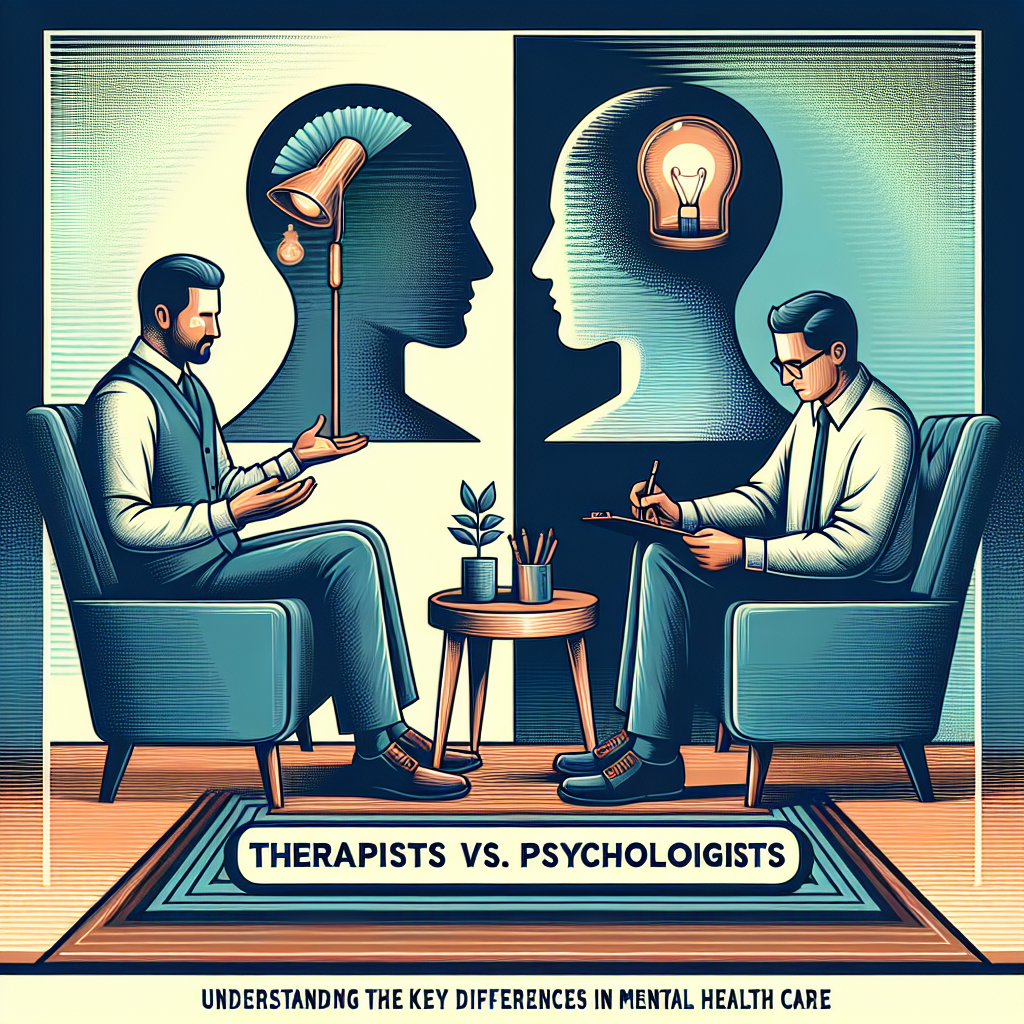
Introduction
Navigating the world of mental health care can be overwhelming. Whether you’re seeking support for anxiety, depression, or any other mental health concern, you may have encountered terms like "therapist" and "psychologist." These titles often lead to confusion, especially for those looking to understand which professional might best meet their needs. Therapists vs. Psychologists: Understanding the Key Differences in Mental Health Care is more than a mere semantic distinction; it directly impacts the type of care you receive. In this article, we’ll delve into these differences, empowering you to make informed choices about your mental health journey.
The Landscape of Mental Health Care
Defining Key Terms
Before examining the differences, it’s crucial to define what we mean by "therapists" and "psychologists."
Therapists: This is a broad term that includes various professionals providing mental health services, including counselors, social workers, and marriage and family therapists. They often have different degrees and training focuses.
- Psychologists: Typically, psychologists hold a doctoral degree in psychology (Ph.D. or Psy.D.). They specialize in assessing, diagnosing, and treating mental health disorders through various therapeutic modalities, often employing evidence-based practices.
The Role of Education and Licensure
| Professional | Required Degree(s) | Licensure |
|---|---|---|
| Therapist | Varies (Master’s typically) | Licensure varies by state and type |
| Psychologist | Doctorate in Psychology | State licensure (must pass exams) |
Understanding the educational background and licensure requirements is essential. Therapists often hold master’s degrees, whereas psychologists usually require a doctorate. This difference reflects the depth of training, which can impact the complexity of issues each professional can effectively address.
The Therapeutic Approaches: A Closer Look
Types of Therapists
Therapists employ a variety of approaches based on their training. Here’s an overview of some common types:
- Licensed Professional Counselors (LPCs): Focus on individual therapy, often providing guidance on coping strategies.
- Licensed Clinical Social Workers (LCSWs): Concentrate on social factors affecting mental health, often bridging clinical work with community resources.
- Marriage and Family Therapists (MFTs): Specialize in relationship issues and family dynamics.
Case Study 1: The Impact of Different Therapeutic Approaches
Consider Sarah, who is experiencing anxiety related to work stress. She consults an LPC who uses cognitive-behavioral techniques to challenge her anxious thoughts. On the other hand, a session with an LCSW might involve exploring her family dynamics that contribute to her anxiety. The choice of therapist significantly influences her therapeutic experience.
Psychologists and Their Specializations
Psychologists offer more nuanced assessments and varied methodologies:
- Clinical Psychologists: Focus on diagnosing and treating mental health issues.
- School Psychologists: Work in educational settings to support children’s learning and emotional well-being.
- Neuropsychologists: Specialize in understanding the relationship between the brain and behavior, often working with issues stemming from brain injuries.
Case Study 2: The Psychology of Learning Disabilities
John, a child in elementary school, struggles with reading. A school psychologist conducts assessments to identify the root cause of his difficulties. Through targeted intervention, John not only improves his reading but also gains confidence, illustrating the importance of specialized knowledge.
Treatment Modalities: What to Expect
Therapeutic Techniques Used by Therapists
Therapists may utilize various methods, such as:
- Cognitive-Behavioral Therapy (CBT): A structured approach that helps patients identify and change negative thought patterns.
- Dialectical Behavior Therapy (DBT): Particularly useful for emotional regulation and interpersonal effectiveness.
Assessment and Treatment by Psychologists
Psychologists often administer formal assessments, such as:
- Personality Tests: To gain insights into a patient’s behaviors and thought processes.
- Intelligence Tests: To evaluate cognitive abilities.
This ability to diagnose and test makes psychologists uniquely qualified for providing evidence-based interventions, especially for specific disorders such as ADHD, bipolar disorder, and more.
The Therapeutic Relationship: Building Trust
Emotional Connection in Therapy
Establishing a therapeutic alliance is key to successful treatment. Therapists tend to foster a supportive environment, focusing on emotional wellness and everyday challenges. Psychologists may also create strong rapport but often incorporate more structured assessments and treatment plans.
Importance of Trust
Imagine Emily, who feels comfortable sharing her personal experiences with her therapist. This foundational trust enables her to explore her issues deeply. If she were with a psychologist, the focus might shift to formal assessments, which, while beneficial, may feel less personal initially.
Limitations and Considerations
Situations Best Suited for Therapists
Therapists can be particularly effective for individuals dealing with:
- Relationship issues
- Life transitions
- Stress management
Situations Best Suited for Psychologists
On the flip side, individuals facing complex mental health conditions often benefit more from the specialized assessments and interventions psychologists can uniquely provide.
Conclusion
Understanding the differences between therapists and psychologists is crucial in navigating your mental health care. Each professional brings unique strengths to the table, and your choice should align with your specific needs. Whether you seek everyday coping strategies or comprehensive psychological assessments, the right support can dramatically improve your mental well-being.
Actionable Takeaway
If you’re considering mental health treatment, take a moment to assess your needs. Asking questions like “What specific issues am I facing?” and “What type of relationship do I want with my provider?” can guide you toward the best professional for your journey.
FAQs
1. Can I start with a therapist and then see a psychologist?
Absolutely! Many individuals start with therapists for general support and transition to psychologists for specific mental health diagnoses.
2. Are therapists and psychologists interchangeable?
No, they have different training and assessment capabilities. While they both provide valuable care, their focus and methods may differ significantly.
3. How do I choose between a therapist and a psychologist?
Assess the complexity of your issues and your personal preferences for interaction. If you need deep psychological assessment, a psychologist might be best.
4. Do therapists diagnose mental illnesses?
Some therapists can diagnose, but typically, psychologists are better equipped for formal diagnoses through comprehensive evaluations.
5. What if my therapist doesn’t have the expertise I need?
Don’t hesitate to ask your therapist for a referral to a psychologist or another specialist who may better suit your needs.
By understanding these distinctions through “Therapists vs. Psychologists: Understanding the Key Differences in Mental Health Care,” you empower yourself to seek the help that’s right for you. Your mental health journey is significant—choose the path that aligns best with your unique story.
















